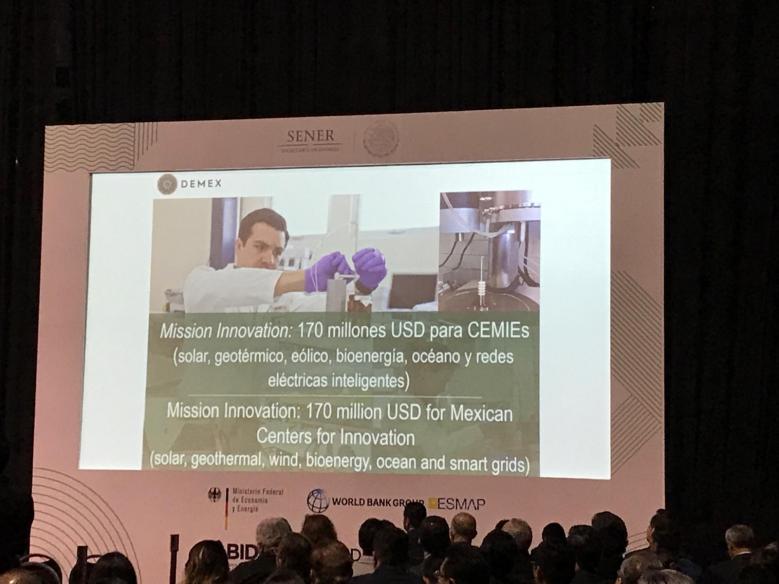
North American Energy Leaders find common ground in Mexico City, strengthen partnership
Mexico City— More than 150 North American energy executives and ministers met in Mexico City on September 12 to discuss how the three countries could cooperate on energy resource development, infrastructure interconnection, and grid modernization to integrate more renewables.
And on the eve of the second round of NAFTA talks, executives agreed that a new trade deal would help sustain or improve energy cooperation among the three countries.
The United States Energy Association, the Energy Council of Canada, and Consejo Mundial de Energía, Capítulo México hosted the annual North America Region Energy Forum in Mexico City on September 12. The three organizations are the national member committees of the World Energy Council (WEC), the London-based global network of energy influencers that advises governments, industry, academia and others on the realities of the global energy picture.
The day-long discussion ran concurrently with Mexico’s celebrated energy conference, Diálogos para el Futuro de la Energía México 2017 (DEMEX).
“The North America Region Energy Forum was significant and timely. It gave us a unique view of the challenges and opportunities that lay ahead for each country’s energy industry and government as each tries to transform its energy sector to make it more efficient, reliable and modern,” said Barry Worthington, USEA’s executive director.
“In the United States, we have a new administration that is focused on building North American energy security and dominance, transforming our electricity industry and developing our energy resources. The U.S. is also part of the renegotiation of NAFTA. Each of our countries touts the benefit of a cohesive North American energy strategy,” Worthington said.
“Despite changes to our executive branch, political rhetoric, polarity and fear, the relationship among the U.S., Canada, and Mexico should remain intact, and will probably get even stronger over the course of the new administration,” Worthington added.
The U.S. Department of Energy has said that greater coordination among the three countries would improve energy system efficiency, data exchange, regulatory harmony, and it would make the system more resilient to any disruptions of the North American energy market.
The three countries were hyper-focused on making their energy infrastructure and grid more modern. “Everyone wants to be cool, clean and green,” Worthington said. “Industry is taking extensive measures to reduce carbon emissions and the younger generation wants to work for companies whose ethos focuses on environmental preservation.”
According to the U.S. Department of Energy, the U.S. has significant energy trade with its North American partners on oil and refined products, gas, and electricity.
Canada is the largest energy trading partner of the United States, with energy trade valued at more than $140 billion. Energy trade with Mexico is also important, at about $65 billion.
The electricity systems of the United States and Canada are fully interconnected with more than 35 active major transmission connections between the United States and Canada, trading about $3 billion worth of electricity.
Canadian natural gas production is expected to slightly outpace consumption with exports rising slowly. The U.S. and Canada are interconnected with 70 oil and gas pipelines. The U.S. Energy Department expects that oil and gas production from shale reservoirs will continue to grow over the next 30 years.
DOE said the reforms in Mexico, meanwhile, provide an opportunity for increased trade with the United States and growth in natural gas exports to Mexico would generate more gas-fired electricity in the country to achieve its environmental goals.
Mexican government officials at the Forum said its own reforms obviate the need for changes to NAFTA.
Pablo Mulás, executive director of the Consejo Mundial de Energía, Capítulo México A.C. said, “It is clear to us that the collaboration among the energy sectors of Canada, the U.S. and Mexico benefit each participant as well as the region.”
“This became abundantly clear during the North America Region Energy Forum where experts took stock of how the three countries rely on the others to meet their energy needs. Some of us provide resources, interconnections, even markets for the others,” Mulás said.
Mexico reformed its energy sector in 2013 and implemented the changes in its constitution and supporting legislation and regulation. The government retains control over its assets, but it opened oil and gas resources to private sector exploration and development as well as electricity generation and commercialization in a wholesale market.
Mulás said the energy reforms created drove momentum among the three countries to help meet Mexico’s energy demand in a more efficient, reliable way.
Executives at the conference discussed four major themes—Medium and Long-Term Scenarios for North America based on WEC’s 2016 Energy Scenarios report; Technologies for GHG Emissions Reductions; Climate Change Policies; and, Energy Trade.
“I was encouraged by the opportunity and desire among my colleagues to connect our North American energy systems further. WEC’s Scenarios underscored a sobering reality--that we are not on track to meet targets aimed at keeping the globe from warming more than 2 degrees Celsius,” said Graham Campbell, president of the Energy Council of Canada.
Campbell said the discussions also amplified the reality that North America would continue to rely on fossil fuels for the foreseeable future, though less so with the expansion of renewable resources into the electricity generation, transportation, industrial and building sector.
“All North American executives agreed that we need a fully integrated, actively monitored and controlled electricity grid, linking transmission, distribution, electricity storage and consumers,” Campbell said. Canada will host next year’s annual North America Region Energy Forum.
###
If you would like to speak with Barry Worthington at USEA, please contact Dipka Bhambhani at dbhambhani@usea.org
If you would like to speak with Graham Campbell at Energy Council of Canada, please contact Max Arsenault at max.arsenault@energy.ca
If you would like to speak with Pablo Mulas of Consejo Mundial de Energia, Capitulo Mexico, A.C., please contact Alejandro Guerrero at programawec@wecmex.org.mex
